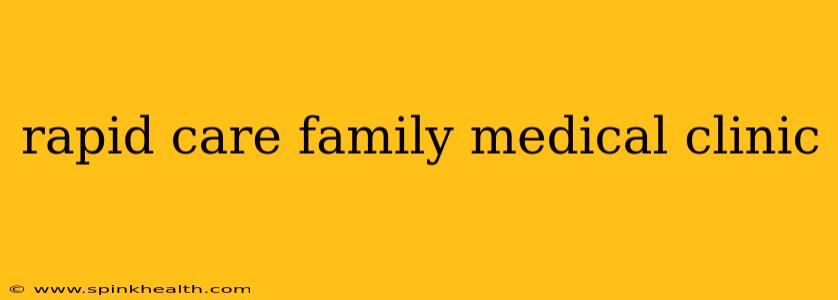Navigating the World of Rapid Care: Your Guide to Family Medical Clinics
Life throws curveballs. One minute you're perfectly fine, the next you're dealing with a sudden illness or injury. That's where the convenience and accessibility of a rapid care family medical clinic comes in. But with so many options available, how do you choose the right one for your family's needs? This guide delves into the world of rapid care, addressing common questions and helping you make informed decisions.
Let's begin our journey by understanding what rapid care clinics truly offer. Imagine a medical facility that bridges the gap between urgent care and your primary care physician. Rapid care clinics provide immediate medical attention for non-life-threatening conditions, offering a faster, more convenient alternative to the emergency room. They often handle illnesses and injuries like colds, flu, minor cuts, sprains, and infections, offering a swift route to relief.
What are the benefits of choosing a rapid care family medical clinic?
The allure of rapid care lies in its speed and accessibility. Long wait times at emergency rooms are a thing of the past. Rapid care facilities often have shorter wait times, allowing you to get the care you need, quickly. This is particularly beneficial for busy families who can’t afford to spend hours waiting in a hospital. Furthermore, many rapid care clinics offer extended hours and weekend appointments, offering flexibility to accommodate even the busiest schedules. The focus on family-centered care often translates to a comfortable and less intimidating environment for children and adults alike.
What types of illnesses and injuries are treated at rapid care clinics?
Rapid care clinics are equipped to handle a range of non-life-threatening conditions. These typically include:
- Common Illnesses: Colds, flu, strep throat, ear infections, bronchitis, and urinary tract infections.
- Minor Injuries: Cuts and lacerations requiring stitches, sprains, strains, and minor burns.
- Other Conditions: Allergies, rashes, headaches, and minor respiratory issues.
However, it's crucial to remember that rapid care clinics are not substitutes for emergency rooms. If you're experiencing a life-threatening emergency, such as a heart attack, stroke, or severe trauma, seek immediate help at the nearest emergency room.
What is the difference between urgent care and rapid care?
While the terms are often used interchangeably, there are subtle differences. Urgent care centers typically offer a broader range of services, sometimes including X-rays and more extensive treatments. Rapid care focuses on providing quick, efficient care for less complex conditions. Think of rapid care as a streamlined, focused approach to common medical issues.
How much does it cost to visit a rapid care clinic?
The cost of a visit to a rapid care clinic varies depending on your insurance coverage and the specific services rendered. It's always a good idea to call ahead and inquire about pricing and insurance acceptance. Many clinics offer transparent pricing information on their websites to help you budget accordingly.
Do I need an appointment to visit a rapid care clinic?
Many rapid care clinics operate on a walk-in basis, eliminating the need for pre-scheduling. However, it's always recommended to check the clinic's website or call ahead to confirm their policy and potential wait times.
Can I establish primary care with a rapid care clinic?
While some rapid care clinics offer primary care services, this is not always the case. Many function as a supplemental option to your existing primary care physician, providing convenient care for acute issues. It's crucial to clarify their services and whether they can serve as your primary care provider before your visit.
Finding the right rapid care family medical clinic involves researching options in your area, considering factors like location, hours, services offered, and insurance acceptance. By understanding your needs and the capabilities of these facilities, you can ensure you receive timely, effective care when you need it most. Remember, proactive healthcare is key to maintaining a healthy and happy family.

